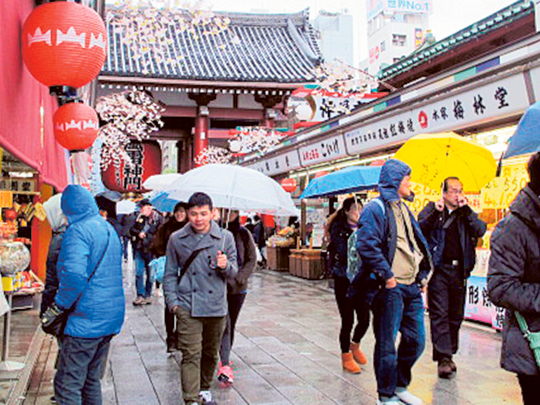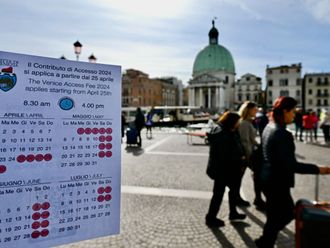
Dubai: Millions of tourists from both East and West visit Japan every year. They come from Canada, US, Sweden, Denmark, India, Australia, China, but only a small fraction come from the Middle East, a fact that Tokyo is attempting to correct.
“Not too many people [in the Middle East] consider Japan a likely holiday destination,” said Shusaku Hinoki, who works in the inbound tourism land operating division of Freeplus Inc, a Japanese private tourism company.
When he visited Dubai earlier this year with the CEO of the company with the aim of promoting Japan as a tourism destination, he told the main reasons was awareness.
“One of the reasons I was given is that Japan is still much unknown in the Middle East” as a tourism destination, he told Gulf News in a telephone interview.
On the other hand, travel agents in Dubai believe it is not difficult to promote Japan as touristic destination, especially to travellers from the Gulf region.
“Basically because Emirates Airline fly there many times a day, and most of the GCC carriers fly, it is easier to promote it as a destination,” said Asif Hussain, manager of outbound tours at Al Tayer Travel Agency, which does offer packages to Japan.
Hussain, a veteran travel agent, noted that Arab tourists usually seek places where they can enjoy shopping, sightseeing, good scenery and an affordable good-luxury accommodation.
While Japan is known for it industrial-based economy, it is also known of its cherry blossoms festivals in spring and maples leaves seasons in autumn. It has several sites listed on the world heritage lists, a rich cultural life and above all, a friendly and punctual people that allow visitors to feel at ease in a country even when they don’t speak its language. During 2014, 13.4 million foreign tourists visited Japan.
“That represents a threefold increase over 2013. During their stay, foreign visitors spent a total of over two trillion Yen on shopping … etc,” the Japanese consulate in Dubai said in a statement sent to Gulf News quoting figures from the Japan National Tourism Organisation.
Today, Japan has an ambitious plan to attract more tourists from the Middle East and the world — the target is 20 million tourists by 2020, which is the year that Japan is set to host the Olympic Games.
Unlike other Asian destinations that are popular to Middle Eastern tourists, such as Malaysia, Thailand and South Korea, Japan is still a new destination, Arab tourists concurred.
However, being a new destination is by itself a motive to visit Japan, some said.
“The people are extremely friendly, and it is a nice place” said a Kuwaiti woman in her thirties who said she visited Japan last April with her friend because “it is a new destination”.
“We spent two weeks in Japan and it is an amazing,” said an Emirati mother of three children as she preparing to get on Emirates flight returning to Dubai.
The mother along with her husband, two adults daughters and young son, wanted to visit Japan because “it is a new destination” and “there are places for children to enjoy”.
She was referring to both Universal Studios attraction and Walt Disney park, both in Japan, as well as scores of cultural sites in both the present capital Tokyo and the previous capital of Kyoto that are listed on Unesco world-heritage list.
Japan also has one of the most efficient public transportation in the world both underground and above the ground. The fast train is a punctual mean of transportation among different cities across Japan.
“It is a city under a city,” commented a Turkish tourist on the Japanese subway system.
Meanwhile, the Japanese government in order to attract more tourists has eased visa restrictions to citizens of many countries, including UAE and Jordan. While Emiratis can apply for a multiple visa to Japan that is valid for three years, Jordanians are exempted from visa fees.
“I think [Japan] is opening up slowly” said Hinoki referring to cultural differences between japan and Middle Eastern countries.
“There have been some movements for restaurants to open up for Muslims and preparing Halal food,” he added.
Apart from the Middle East, there are an increasing number of tourists from Muslim countries in the Far East, such as Indonesia and Malaysia to Japan. The number of Indonesians visiting japan has jumped from 63,617 in 2009 to 136,797 in 2013, and the number of Malaysian tourists in to Japan doubled from 89,509 in 2009 to 176,521 in 2014, figures show.
While some tourists say Japan is a country for “niche tourism”, as it is a little expensive place for tourism, others believe it is a country that is worth seeing.
Neighbouring South Korea is Japan’s most important source of foreign tourists. In 2014, 2,755,313 Koreans visited Japan and in the first quarter of 2015 the numbers of Korean tourists reached 947,900, according to an estimate by Japan National Tourism Organisation (JNTO).
Out of last year’s tourists, only 59,909 tourists from the Middle East, including a 14,816 tourists from the GCC countries, went to Japan.












